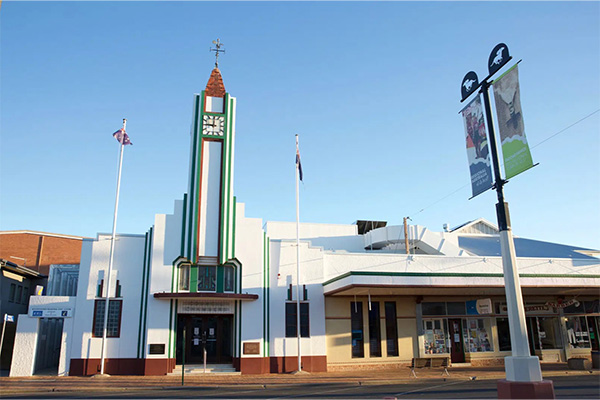And the fix
Active transport advocates have long been frustrated by the slow machinations of traffic where even small changes to streets to improve conditions for walking and cycling face inexplicable red tape.
Projects are delayed and cancelled while seeking compliance with documents drafted decades ago. Indeed, many street design standards are no longer appropriate for a growing city.
Bicycle NSW has explored the underlying issues with Walk Sydney and Better Streets colleagues. We asked - what can be done to stop old-school thinking holding up progress towards Better Streets?
Old world charm: Goondiwindi Council and Local Traffic Committee headquarters (Credit Goondiwindi council)
Firstly, what are traffic committees?
Local Traffic Committees (LTC) were established to delegate some of the responsibilities for managing roads to local councils. And with a vast network of more than 200,000 kilometres of roads, sharing the responsibility makes perfect sense. Each Local Traffic Committee consists of 4 representatives: one from Transport for NSW with engineering/safety qualifications; police with just 2 weeks traffic training; a local State Member and a Councillor.
The LTC reviews proposed road changes, access, closures and parking. It also advises council on traffic matters but doesn’t have decision-making power. Meanwhile, Transport for NSW controls NSW road traffic under the Road Transport Act.
NSW is the only state with Local Traffic Committees
Western Australia had a similar entity until the 1980s. Victoria had local traffic committees during the 1930/40s. At present, minor tasks are delegated to councils, while "major works" require VicRoads/DoT approval. Queensland has voluntary traffic groups, but there is no equivalent in WA and the ACT.
In New South Wales, the Local Traffic Committee was formed in 1976, with police representation added in 1983. Delegation guidelines were written in 2009. Incredibly, there has only one change - for a train station parking amendment in 2011.
However, there hasn't been a single independent review of LTCs since 1976. Moreover, here’s no review requirement under the Act.
Out of time and out of step
The main criticism about the NSW Local Traffic Committees is that they are an anachronism, out of step with community expectations. 1970s car-first planning has been disastrous for our health, safety, the economy, and the environment. The NSW Government acknowledges this and puts pedestrians first in its transport strategies. Yet the old order remains firmly entrenched through the gatekeeping role of LTCs.
Despite this, a few LTCs are doing the best they can to advocate for people-friendly streets. For instance, the Inner West Council LTC objected to a new Bunnings megastore in Tempe. That’s because excess traffic would congest a narrow suburban street that connects kids to their local primary school.
Getting it right: Inner West LTC prioritised kids’ safety over cars which led to a ‘David and Goliath’ battle with Bunnings (Image: Inner West Council)
Ineffective, unaccountable, and opaque
A major issue with LTCs is that representatives are 75% untrained. In addition, performance isn’t bound to current local or state policies. For instance, delegates may not have heard about or agree with the Movement and Place Framework. Or the updated road user hierarchy that places active travel at the top and private vehicles at the bottom.
It follows that the LTC will generally regard safety solely from the point of view of fast, efficient traffic flow. This in turn compromises the safety of everyone else not encased in a metal box. Efficiency problems also arise due to high costs unique to NSW and duplication of basic functions. And transparency is partial with limited public access to meetings and minutes.
City of Canada Bay Council provides a recent case study in the unaccountable and opaque gate-keeping function of LTCs. This resulted in the demolition of an excellent cycleway and waste of state revenue.
Death by committee: Canada Bay Local Traffic Committee voted to rip out an excellent cycleway without reasonable cause (Image: Bicycle NSW)
How can we reform Local Traffic Committees?
Tegan Mitchell, Transport Manager with the City of Sydney, has shone some light on how LTCs could be reformed.
“Let councils directly handle low-to-medium complexity issues that are minimum risk. Meanwhile, an expert review panel would tackle complex cases,” says Tegan. “Clear guidelines would trigger reviews, aligning with council strategies and focusing on outcomes like walking, cycling, and public spaces. Councils would also decide the panel's composition based on their priorities, striking a balance between overarching strategies and localized perspectives.”
Pressure from walking and cycling advocates has led to recent improvements. In February 2023, Transport for NSW has issued a new ‘Temporary Delegation to Councils’. This exempts a range of minor traffic works on local streets from review by the Local Traffic Committee (LTC) process. As a result, councils now have an alternative approval pathway for pedestrian crossings and 10 other minor street upgrades.
The new delegation is a huge step forward. Small changes to kerbs, refuges and signage can have a big impact on comfort and safety. But councils need to wrestle back more control.
“In order to reach our Vision Zero objectives, improve our health and the environment, we must reform traffic committees. Currently they are acting as unconscious gatekeepers to safer streets when they could be powerful allies,” says Peter McLean, CEO Bicycle NSW.
What can you do?
- Write to your council and ask much-needed street upgrades
- Educate council officers about the new delegation.
- Write to Roads and Transport Ministers and ask for traffic committee reform
Tempe kids defend their right to be safe from cars on their local street. (Image: Inner West Council)
Just one more thing
Not only do we have the best bicycle insurance, but Bicycle NSW has been actively campaigning for 47 years in NSW for better infrastructure for bike riders of all ages and abilities. Join us now and support our campaign for Better Streets.





